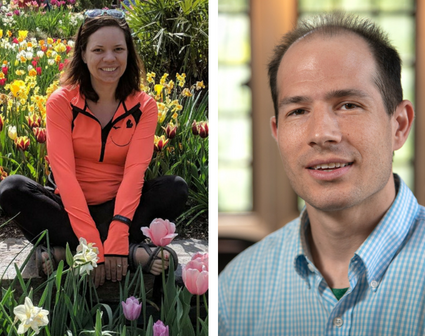
The Center for Applied Genomics and Precision Medicine (CAGPM) is excited to announce the two newest postdoctoral training fellows in genome medicine research, Marie Mooney, Ph.D., and Bill Hankey, Ph.D. This program, administered by CAGPM and supported by an NIH T32 award provides postdoctoral fellows the opportunity to gain didactic and research experience in genome medicine.
Dr. Mooney received her Ph.D. in Cell and Molecular Biology in Human Health from Van Andel Research Institute in Grand Rapids, Michigan. She hopes to improve the accuracy and confidence of research solutions that translate the statistical modeling of multidimensional ‘omics data into actionable clinical knowledge. “Participating in the Genomic Medicine T32 training program will help me achieve that goal by strengthening my methodological understanding of current genomic analysis and facilitating interactions with interdisciplinary mentors who are already pioneering better translational approaches,” Mooney said. Her proposed research project will be aimed at improving pediatric diagnostics through paired exome and RNA-sequencing supported by functional testing. “I anticipate that the skills and experiences I cultivate,” Mooney said, “will critically enable my professional development toward an independent research career.”
Dr. Hankey received his Ph.D. in Biomedical Sciences from Ohio State University in Columbus, Ohio. He wants to design and execute translational research projects that improve care for patients with cancer. “My short-term goal,” Hankey said, “is to learn to design translational research projects around the most clinically valuable questions rather than the most technically feasible or convenient ones.” Hankey’s research goals include generating clinically-relevant genomic data to assess how normal prostate and prostate cancer cells respond to drugs such as sildenafil (Viagra). “The Genomic Medicine Training Program directly addresses critical areas that receive less emphasis during the traditional education of most basic scientists,” Hankey said.
As Mooney and Hankey start the two-year training program, they will begin working with their mentors to create an individualized development plan, which will include a set of activities and goals, didactic courses, ongoing conferences and seminars, and their mentored research projects.